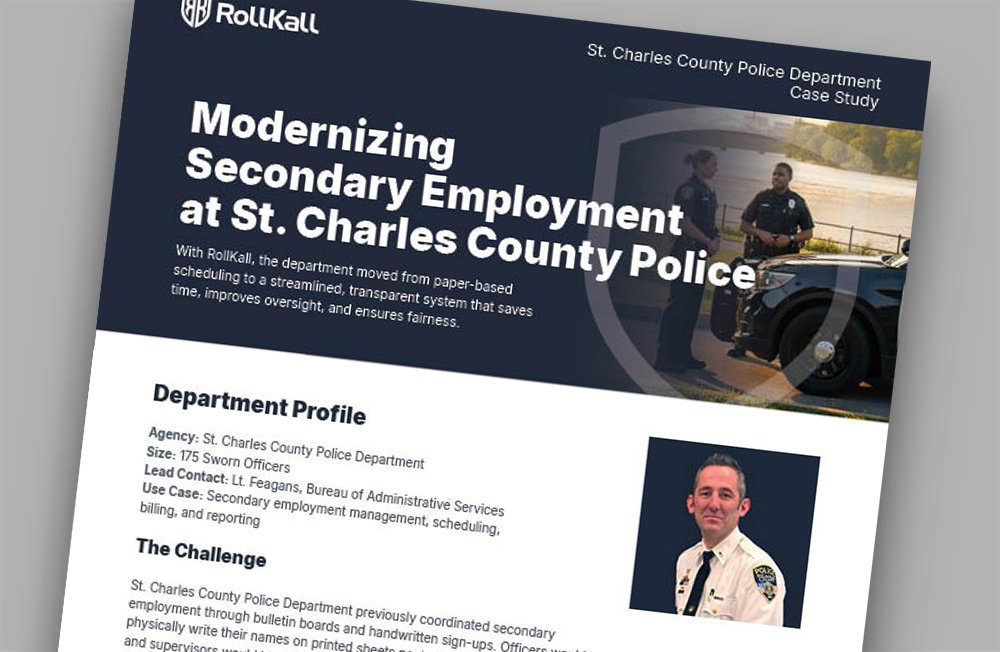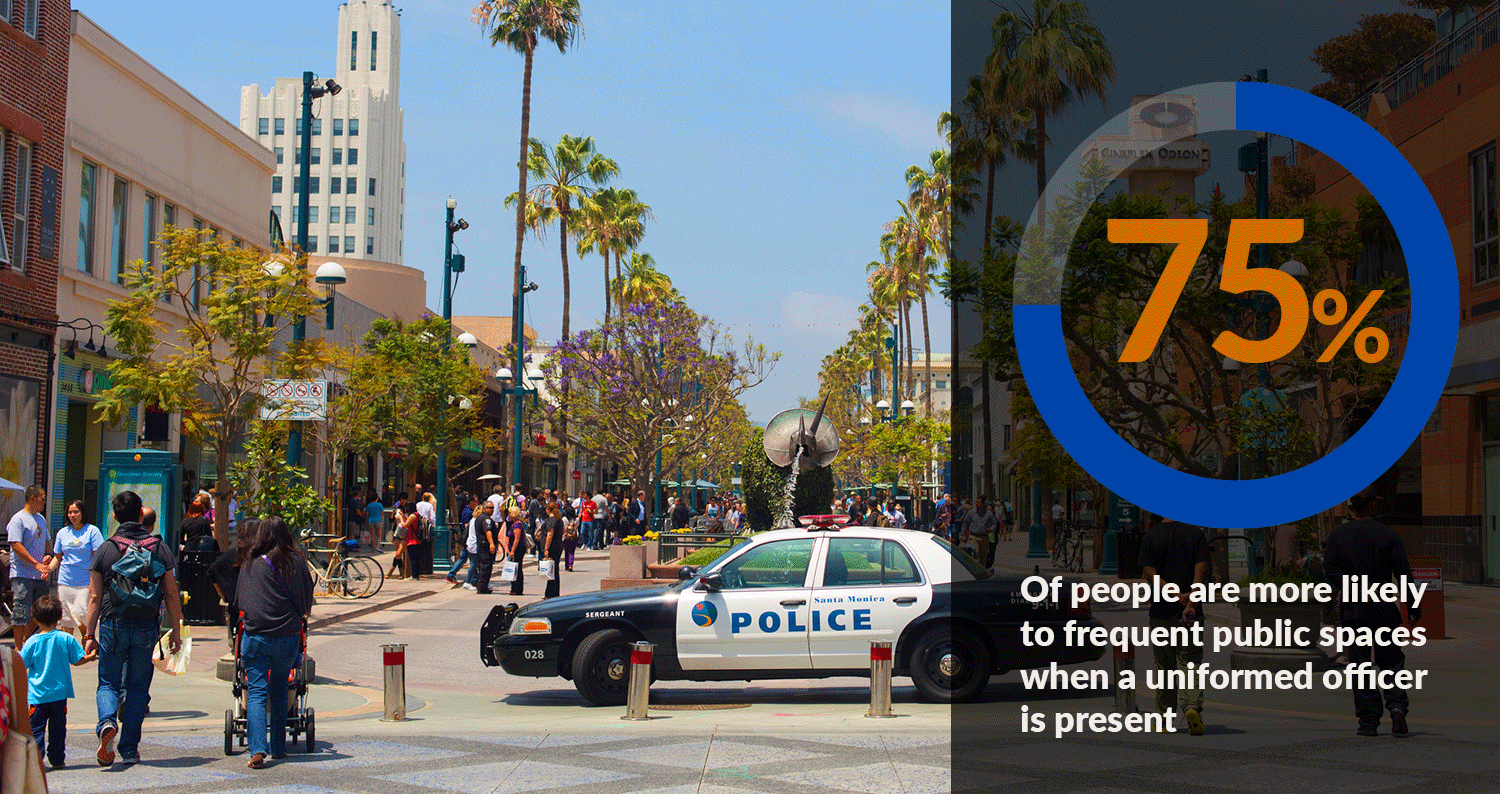Case Study: St. Charles County Police Department
With RollKall, the department moved from paper-based scheduling to a streamlined, transparent system that saves time, improves oversight, and ensures fairness.

Modernizing Secondary Employment at St. Charles County Police
With RollKall, the department moved from paper-based scheduling to a streamlined, transparent system that saves time, improves oversight, and ensures fairness.
Department Profile
Agency: St. Charles County Police Department
Size: 175 Sworn Officers
Lead Contact: Lt. Feagans, Bureau of Administrative Services
Use Case: Secondary employment management, scheduling, billing, and reporting
The Challenge
St. Charles County Police Department previously coordinated secondary employment through bulletin boards and handwritten sign-ups. Officers would physically write their names on printed sheets posted inside the station, and supervisors would highlight who got the job that week. There was no centralized system to track hours, assignments, or workload across shifts.
“We were working with crayons and paper. Officers could be working 12-hour shifts and then tacking on another six hours of secondary duty,” said Lt. Feagans. “There was no accountability. No one knew who was working what, and we couldn’t track it even if we wanted to.”
Beyond scheduling, the department struggled with billing inconsistencies and documentation gaps. Work funded through grants, contracted private jobs, and church security details were all handled differently - often tracked on paper or memory. Without a standardized process, payment delays and audit risks became common.
The Turning Point
Recognizing the liability and inefficiencies of this outdated system, department leadership made a push for change. Chief Kurt Frisz - who had previously worked at a neighboring agency using RollKall - initiated a modernization effort aimed at improving structure, transparency, and officer safety.
According to Lt. Feagans, the impact was immediate.
“We didn’t even realize how much we were missing. Now, we can separate metrics for contracted billing versus grant-funded work. The app gives us visibility into everything - and we’re no longer chasing down payments or trying to remember who worked what.”
Implementation
RollKall’s implementation was fast, intuitive, and required little disruption. Administrative staff and supervisors attended virtual onboarding sessions, followed by in-person training that allowed front-line sergeants to confidently support their teams.
What surprised leadership most was how quickly officers adopted the system.
“We didn’t even hold a formal training for the officers,” said Lt. Feagans. “I sent out an email with instructions to download the app and create an account. Within 48 hours, over 100 officers had signed up and were actively using it.”
Most of the department’s officers are younger and already rely on smartphones for banking, shopping, and scheduling in their daily lives. The idea of using a mobile app to manage secondary jobs wasn’t disruptive, but long overdue.
“This generation of officers manage everything from their phones,” Lt. Feagans explained. “They were ready for the department to catch up. We weren’t asking them to change behavior - we were finally aligning with how they already operate.”
Vendor Transition and Feedback
Early concerns about vendor resistance proved unfounded. Many vendors had managed payments manually for years and were assumed to be reluctant to adopt new systems.
“To my surprise, not a single vendor complained. I thought we’d get major resistance - telling vendors they had to sign up on a portal after doing things the same way for 30 years. But nobody pushed back. In fact, they said, ‘Finally.’ We were the only ones doing things the old-fashioned way.”
Because most vendors were already familiar with digital payment systems, onboarding to RollKall felt natural and welcomed. Treating the police department like any other professional service provider added clarity and legitimacy to the process.
Results
- Over 100 officers onboarded in under 48 hours
- 80% or more of all secondary employment now managed through RollKall
- Full visibility into scheduled hours, payments, and job history
- Simplified grant and billing reporting with built-in metrics
- Elimination of favoritism in job assignments
- Reduced administrative burden for coordinators
Advice for Other Agencies
Lt. Feagans offered direct advice for departments still relying on manual processes or outdated scheduling tools.
“You can cut time in half or more,” he said. “Once I set up a job in RollKall, I can tell it to continue for three years and never touch it again. I would spend hours every month entering the same jobs over and over - now the system does it for me.”
He also highlighted how the system’s reporting features added a level of visibility that was previously impossible.
“Before RollKall, we had zero data. Now we know exactly how many hours were worked, by whom, and when. Which is huge for grant reporting, billing, and overall transparency.”
RollKall’s customer support was another key factor in the successful rollout.
“Jessalynn and Gerardo were elite. I never waited more than ten minutes for a response. I never felt like I was on an island, and that made all the difference.”
Conclusion
St. Charles County Police Department has fully embraced digital transformation in its secondary employment program. With RollKall, they have gained efficiency, fairness, and accountability - all while simplifying scheduling and strengthening relationships with vendors and officers alike.
“This platform changed how we operate,” said Lt. Feagans. “We’re more efficient, more professional, and more accountable - to our officers, our community, and our partners.”










